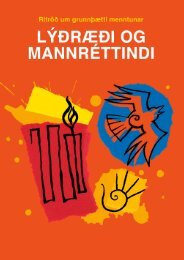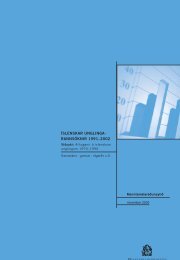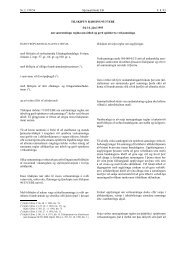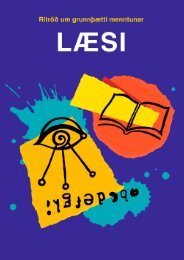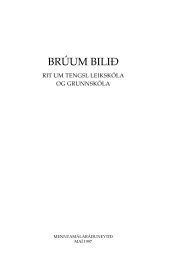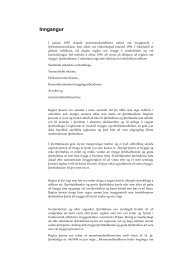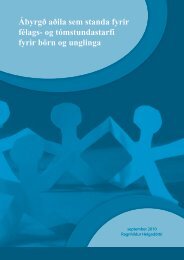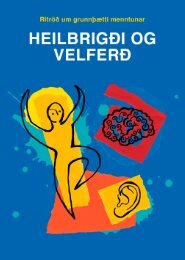Arts and Cultural Education in Iceland : Professor Anne Bamford
Arts and Cultural Education in Iceland : Professor Anne Bamford
Arts and Cultural Education in Iceland : Professor Anne Bamford
Create successful ePaper yourself
Turn your PDF publications into a flip-book with our unique Google optimized e-Paper software.
‣ Fund<strong>in</strong>g should encourage risk tak<strong>in</strong>g <strong>and</strong> experimental approaches<br />
Flexible, research-orientated approaches, comb<strong>in</strong>ed with project-based methods, encourage<br />
an educational climate where the teachers, artists <strong>and</strong> pupils engage <strong>in</strong> learn<strong>in</strong>g conversations<br />
<strong>and</strong> test their ideas. Inquiry-based approaches enable spontaneous situations to be <strong>in</strong>corporated<br />
to create <strong>in</strong>terest<strong>in</strong>g <strong>and</strong> mean<strong>in</strong>gful art-based learn<strong>in</strong>g opportunities.<br />
It appears that as a general pr<strong>in</strong>ciple, Icel<strong>and</strong>ic education supports research <strong>and</strong> <strong>in</strong>quiry <strong>in</strong>to<br />
education <strong>and</strong> culture. Pupils are encouraged from an early age to be responsible <strong>and</strong><br />
<strong>in</strong>dependent. The strong <strong>in</strong>clusion of environmental learn<strong>in</strong>g, especially <strong>in</strong> the pre-primary<br />
school <strong>and</strong> compulsory school years means that Icel<strong>and</strong>ic children are confident <strong>and</strong> mature. In<br />
secondary education pupils are actively encouraged <strong>and</strong> rewarded for tak<strong>in</strong>g <strong>in</strong>itiative <strong>and</strong> pupilgenerated<br />
activities <strong>in</strong> the arts are common place.<br />
Young pupils are encouraged to work with ‘real’ tools <strong>and</strong> learn<strong>in</strong>g experiences. Pre-primary<br />
school education <strong>in</strong> Icel<strong>and</strong> is particularly strong <strong>in</strong> encourag<strong>in</strong>g problem-based approaches <strong>and</strong><br />
<strong>in</strong> l<strong>in</strong>k<strong>in</strong>g learn<strong>in</strong>g to the environment <strong>and</strong> the community.<br />
In the areas of wood <strong>and</strong> textile crafts, considerable use is made of projects. In good practice<br />
examples, these projects are supported by build<strong>in</strong>g with<strong>in</strong> the pupils a depth of awareness of<br />
design processes, prototyp<strong>in</strong>g <strong>and</strong> risk tak<strong>in</strong>g. In other less high quality <strong>in</strong>stances, the projects<br />
are overly teacher-directed <strong>and</strong> tend to emphasise skills development without adequately<br />
challeng<strong>in</strong>g the pupils to engage <strong>in</strong> higher order th<strong>in</strong>k<strong>in</strong>g <strong>and</strong> to strive for orig<strong>in</strong>ality. Due to the<br />
shortage of qualified teachers <strong>in</strong> these areas of the curriculum, <strong>in</strong>dustry experienced<br />
practitioners may teach these subjects. In some <strong>in</strong>stances this has led to highly <strong>in</strong>novative <strong>and</strong><br />
advanced practices of direct relevance to the field. Professional <strong>and</strong> educational l<strong>in</strong>ks are to be<br />
encouraged as a way to embed more creative based projects <strong>in</strong> the classroom.<br />
Generally, throughout the country, the wood <strong>and</strong> textiles studios are very well equipped <strong>and</strong><br />
could be opened up to provide workspaces to professionals. This <strong>in</strong> turn could exp<strong>and</strong> the<br />
repertoire of projects available with<strong>in</strong> the school, especially <strong>in</strong> smaller rural <strong>and</strong> regional schools.<br />
While the technical <strong>and</strong> skills-based tra<strong>in</strong><strong>in</strong>g with<strong>in</strong> further <strong>and</strong> higher education (college<br />
level <strong>and</strong> above) with<strong>in</strong> Icel<strong>and</strong> is on a very high st<strong>and</strong>ard, this is not matched by a higher level<br />
research culture <strong>in</strong> the arts. Many of the tertiary level <strong>in</strong>stitutions visited bemoaned the lack of<br />
resources to support research <strong>and</strong> the lack of <strong>in</strong>dividuals to lead the development of a practiceled<br />
research <strong>and</strong> <strong>in</strong>quiry culture <strong>in</strong> Icel<strong>and</strong>.<br />
The importance of research was evidenced by the unanimous support given to this study<br />
<strong>and</strong> the researchers <strong>in</strong>volved. This research was not only appreciated for the knowledge it might<br />
br<strong>in</strong>g to the field of arts education, but moreover was appreciated for the opportunity provided<br />
by this research to share some of the issues surround<strong>in</strong>g arts education <strong>and</strong> to be more closely<br />
connected with <strong>in</strong>ternational research dialogues around art <strong>and</strong> culture. Staff at all the tertiary<br />
<strong>in</strong>stitutions visited bemoaned the lack of research <strong>and</strong> praised the ways this research was<br />
allow<strong>in</strong>g the on the ground voice to be amplified. They expressed concern that a lack of time <strong>and</strong><br />
expertise prevented them from hav<strong>in</strong>g more opportunity to get <strong>in</strong>to the field, though there was<br />
widespread acknowledgement that there are lots of good <strong>in</strong>terventions at the local level.<br />
Despite a central commitment to research <strong>and</strong> <strong>in</strong>quiry based practices, many organisations<br />
do not have any fund<strong>in</strong>g to complete even the smallest reflective <strong>in</strong>quiry. To do research is not<br />
easy. Many organisations are modest, not-for-profit organisations. They do all the coord<strong>in</strong>ation<br />
71



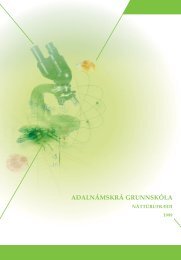
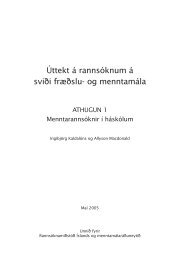
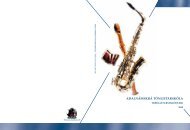
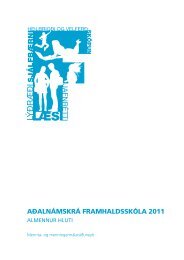
![Aðalnámskrá tónlistarskóla : rytmÃsk tónlist [Eingöngu á rafrænu formi]](https://img.yumpu.com/50843672/1/184x260/aaalnamskra-tanlistarskala-rytma-sk-tanlist-eingangu-a-rafranu-formi.jpg?quality=85)
